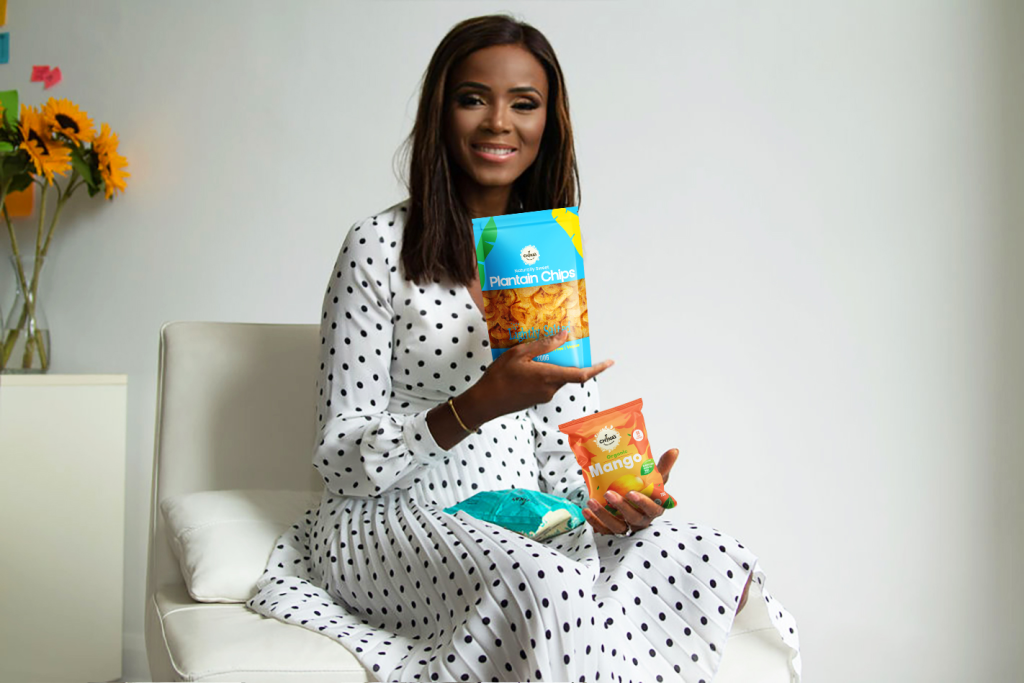In 2015, British-Nigerian entrepreneur Chika Russell walked into the Dragons’ Den without any idea she was about to make television history. She would go on to secure offers from all five Dragons, only to make an even bolder decision to turn them all down.
Today, her snack food empire is worth over £10 million, proof that sometimes the biggest risks lead to the greatest rewards.

From Hairdresser to Entrepreneur
Chika Russell’s entrepreneurial journey began long before she ever dreamed of manufacturing snacks. She was born in London as the youngest of seven children to Nigerian parents and learned the value of hard work early. “I got my first part-time job as a hairdresser at my mother’s hair and beauty salon. I was just 14,” she would tell ThisIsMoney in 2022.
What started as weekend work quickly became lucrative. Russell’s talent with hair impressed customers, leading to higher demand for her services. “I started quoting ridiculous prices because I didn’t want to work every weekend. It got to the point where I could earn £1,000 for four or five hours’ work,” she explains. “Often I would earn £2,000 a weekend. I had no living expenses and I saved every penny. By the time I was 22, I had managed to build up savings of £140,000.”
This impressive nest egg allowed her to purchase three properties in South London. This strategic investment would later provide crucial rental income during the early years of her business.
The Birth of Chika’s Foods
After completing her education and working as a management accountant at prestigious firms like Royal Bank of Scotland and ICAP, Russell found herself at a crossroads in 2014. On maternity leave and expecting her second child, she was ready for a change from the demanding world of accounting where she worked gruelling 12-hour days.
The inspiration for her business came from an unexpected source: dinner parties. “I was thinking about the West African snacks she made when people came over for those art exhibitions, like hand-toasted peanuts and plantain chips,” she told the Independent. “People were always so kind about these snacks, and I would think, that’s because they’re free!”
Born in the UK but deeply connected to her Nigerian heritage through childhood summers spent there, Russell had a unique perspective. “I feel like the traditions, the food, the culture, are instilled in me and my children,” she explains. She identified a gap in the UK market for Nigerian-inspired snacks and decided to fill it.
By the end of 2014, Chika’s Foods was officially registered. Russell began by making hand-toasted and flavoured peanuts and plantain crisps at home, initially selling to local cafés, delis, and gastropubs. The response was overwhelmingly positive, giving her the confidence to approach major supermarkets.

Chika Russell’s Dragons’ Den Moment
When Russell entered the Dragons’ Den in 2015, her company was already showing promise, stocked in 150 outlets with £160,000 in turnover. She asked for £30,000 for a 5% stake in her company, but what happened next was unprecedented.
“I remember noticing how incredibly dark the studio was, and it was silent. You could hear a pin drop,” she recalls of the experience. While her segment lasted 15 minutes on television, she spent three and a half hours in the Den. All five Dragons made offers that ranged from 10% to 25% equity. The negotiation became tense, with Peter Jones threatening to pull out, telling her: “I’m about to say those two words [I’m out] Chika… you need to make decisions because it’s getting frustrating.”
Eventually, Russell accepted Peter Jones’s offer of £30,000 for 25% of her company. But the real drama happened after filming.
The Bold Decision to Walk Away from Multiple Offers
Despite securing a deal on television, Russell made a decision that shocked many – she turned down Peter Jones’s investment. “I just felt that we were probably not the right match. I didn’t feel super excited about the idea of working with him,” she explained.
Jones was reportedly disappointed. “He tried to convince me to change my mind – we went backwards and forwards a little bit, he asked me if there was anything he could do, but my mind was made up,” Russell revealed.
This decision proved pivotal. “Weeks afterwards I just wasn’t excited about the deal,” she explains. “I chose the best Dragon for me, so I don’t regret that, but I just wasn’t excited. I didn’t get that feeling of, ‘Wow, we’re going to be on this amazing journey together.'”

Building an Empire
Russell’s gamble paid off spectacularly. Two years after rejecting the Dragons’ Den offer, she secured £800,000 from eight high-net-worth investors, including executives from United Biscuits, lastminute.com, Virgin Money and Soho House – “for a much lower equity than what Peter offered.”
The business grew rapidly, and she secured distribution deals with major retailers including Waitrose, Ocado, Whole Foods and Sainsbury’s. But Russell had bigger ambitions. “In the beginning, the plan wasn’t to launch in Africa because that dream was just too big for me,” she admitted. “The UK was an addressable market.”
Returning to Her Roots
By 2020, Russell was ready for her biggest challenge yet: expanding into Nigeria. She partnered with Alitheia IDF, a private equity firm, which invested £9.8 million in December 2021 to launch Chika’s Wholefoods Africa.
The expansion required building a factory on the outskirts of Lagos and hiring over 100 people initially, which later grew to 200-plus employees. “We went into hiring a team straight away, over a hundred people, from factory build engineers to architects, to quality assurance, to procurement.”
Interestingly, Russell adapted her product line for the African market based on extensive research. While the UK focuses on plantain crisps, cashews, and almonds, Nigeria launched with three flavours of maize puffs: Chicken Chop, Fire Grill and Easy Cheesy.
“In Europe, consumers want gluten-free, low-salt, vegan and vegetarian snacks with re-sealable packaging. In Africa, it is completely different. People want a snack that they can immediately consume and if the pack is too big, they will share it with other people.”

The Numbers Today
Today, Chika’s Foods is a witness to Russell’s vision and determination. The company now employs 230 people across both markets, with plans to reach 350 by year’s end. From 5 products when she appeared on Dragons’ Den, the range has expanded to 18 products across 3,000 distribution points in the UK and thousands more in Nigeria.
“Revenue-wise, we were at £160,000 then, and as a group, this year we’ll do £5.5 million,” Russell noted. She emphasised that “only because it’s our year one in Africa and Africa continues to be the larger part of our business.”
The company has already attracted acquisition interest from major players, though Russell isn’t ready to sell. “We still have quite a bit of growth to do,” she says.
Giving Back and Looking Forward
True to her values, Russell incorporates social impact into her business model. The company donates a penny from every pack sold to World Vision, helping empower girls and women through education in Africa. “It makes me feel good because when I sell a product I am not just making money for myself, but helping make the world a better place.”
Looking back on her Dragons’ Den experience, Russell has no regrets. “Maybe I should have gone with Peter, maybe by now Chika’s would have been all over the world, but I don’t regret my decision and am super proud of what I have achieved.”
Her advice to other entrepreneurs considering the show? “I would highly recommend others going on the show due to the incredible exposure Dragons’ Den can bring to a brand.” Even now, years later, “We still get a huge amount of pick up and an uptick in sales whenever it airs.”
Want to Join the Ranks of Immigrant Businesses Succeeding in the UK?
Chika Russell’s story above bear witness to the entrepreneurial spirit that fuels the UK’s future. Immigrant businesses succeeding in the UK are not an exception; they are becoming the norm. They create jobs, diversify the market, bridge cultures and most importantly, redefine what’s possible.
You don’t need a million-dollar idea or a network of insiders to start a business in the UK as an immigrant. You need a vision, a plan and the right guidance. Whether you’re an international student with a side hustle, a permanent resident looking to formalize a craft, or a newcomer dreaming of launching a food stall, we’ve got you covered. Our complete guide covers the following:
- How to choose a business structure
- How to register your business
- How to open a business account
- Everything related to taxes, permits and licences
- How to fund your businesses
- Other relevant information pertaining to international students, residents and non-residents.
Get Started Here.












